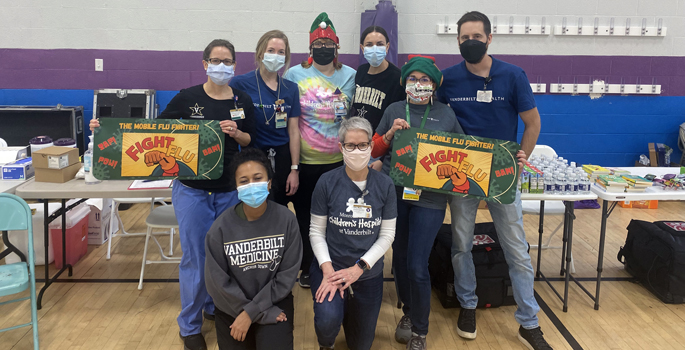
Before the current rise in flu cases in Middle Tennessee, a group of doctors and nurses at Monroe Carell Jr. Children’s Hospital at Vanderbilt set out in the fall to protect children from flu before it ever arrived.
The team, led by pediatrician Elizabeth Williams, MD, MPH, dubbed its project “The Mobile Flu Fighter!” The pilot project aimed to bring flu vaccines and education into areas of the Nashville community where flu vaccine uptake is lower, particularly among Black children. The Vanderbilt University Medical Center Office for Health Equity provided grant funding to support the initiative.
“In our primary care clinic on DOT8 in Children’s Hospital, we looked at our uptake of flu vaccine among patients, and we found that there is a big disparity between patients who are Black/African American and all other races, as far as uptake of the flu vaccine. As a team we developed a health equity flu vaccine team and we were trying to reduce this disparity,” said Williams, assistant professor of Pediatrics.
In a review of flu vaccine uptake rates among pediatric patients of the Primary Care Clinic, the team found that about 61.6% of Black pediatric patients received the vaccine compared to 87.6% of white pediatric patients.
Much of the disparities in vaccine uptake are driven by key factors, she said. The team held focus groups with mothers to understand why they were not ready to get the flu vaccine for their children.
“One of the biggest things to come out of the focus group was trust — just the sense of trust with the providers. And there is also still a lot of misinformation about what the flu vaccine is, if it can cause the flu and whether you even need it, especially since it is not required for school,” Williams said.
The Mobile Flu Fighter! unit identified different ZIP codes where there were lower flu vaccination rates among the DOT8 pediatric patient population. The team planned for five community-based events in collaboration with other local community organizations, like Second Harvest, the Nashville Public Library, the Nashville Diaper Connection, among others, to create family-friendly events.
Over the course of four events, the volunteer team of physicians, nurses, coordinators and residents traveled in The Mobile Flu Fighter! van with their vaccination supplies and information to each site. In total, about 50 children were vaccinated, and many more families were provided with information about the vaccine. The final flu vaccine event in January had to be postponed due to the last COVID-19 surge with the omicron variant.
Educating families about the vaccine was an important part of the initiative.
“We want parents to know that flu is one of the more serious viral illnesses out there, and it causes kids to be hospitalized; every year kids die from the flu. The flu vaccine is safe, and you cannot get the flu from the vaccine,” Williams said.
With the pilot program finished, the Mobile Flu Fighter! team will assess and evaluate strategies used and consider how to proceed next year, possibly combining forces with other similar initiatives around Vanderbilt to grow the project.
“We appreciate all our volunteers. This was mostly volunteer driven and we are grateful for their time and effort to make this pilot year a success,” Williams said.
People and teams involved in the pilot project include: Barron Patterson, MD, Shari Barkin, MD, MSHS, Kelly Moore, Meredith Denney, the VUMC Healthy Equity Team, and many others.












